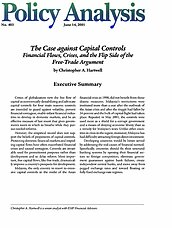However, the empirical record does not support the beliefs of proponents of capital controls. Protecting domestic financial markets and impeding capital flows have often exacerbated financial crises and caused contagion. Controls are invariably used for protectionist purposes rather than development and to delay reform. Most important, free capital flows, like free trade, dramatically improve a country’s prospects for development.
Malaysia, the only country to resort to extensive capital controls in the midst of the Asian financial crisis in 1998, did not benefit from those drastic measures. Malaysia’s restrictions were instituted more than a year after the outbreak of the Asian crisis and after the ringgit had fallen by 34 percent and the bulk of capital flight had taken place. Repealed in May 2001, the controls were used more as a shield for a corrupt government and a means of denying economic liberty than as a remedy for Malaysia’s woes. Unlike other countries in crisis in the region, moreover, Malaysia has had difficulty attracting foreign direct investment.
Developing countries would be better served by addressing the real causes of financial turmoil. Specifically, countries should fix their unsound banking systems by opening their financial sectors to foreign competition, eliminate government guarantees against bank failures, create independent central banks, and move away from pegged exchange rates and toward floating or fully fixed exchange-rate regimes.

